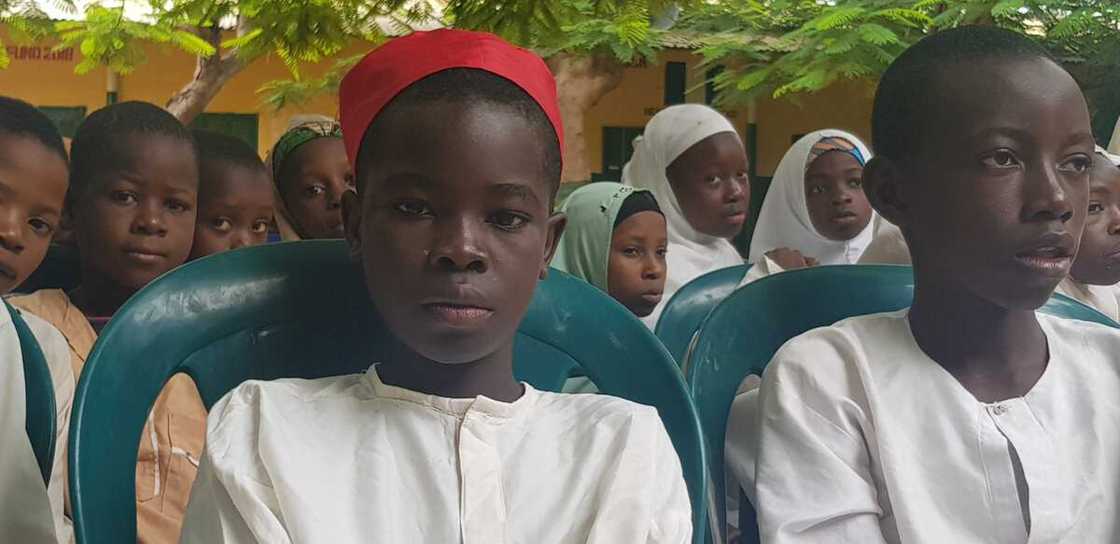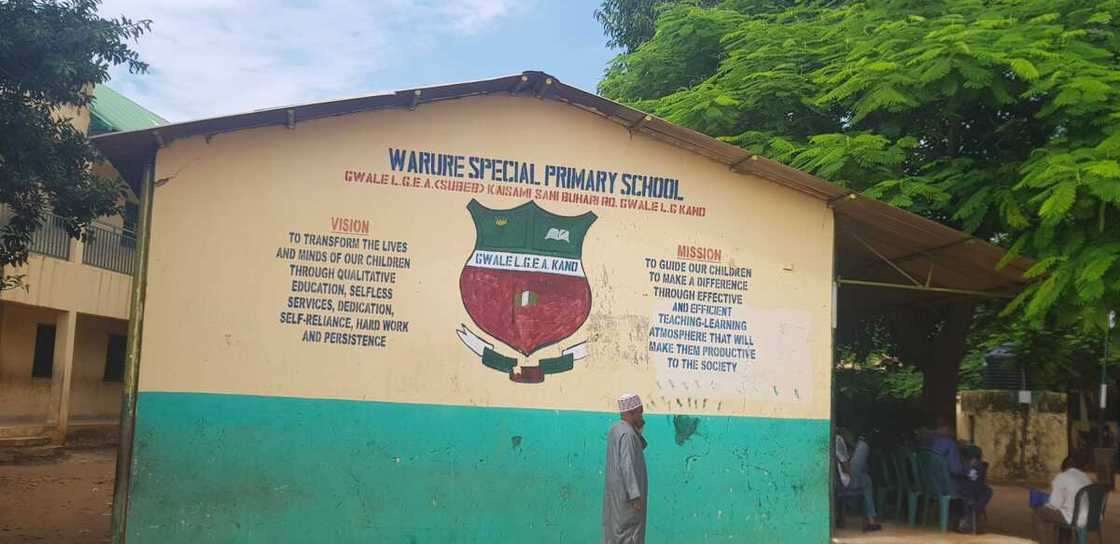How 12-year-old chairman of children's committee encourages Kano kids to go to school
- 12-year-old Habibu Usman is the chairman of a children's committee that ensure kids do not drop out of school in Gwale local government of Kano state
- Habibu said his committee embarks on a house-to-house to enlighten parents and children on the need for basic education in life
- According to Habibu, the house-to-house campaign has successfully helped to increase the number of school children Gwale
Walking into Warure Special Primary School (WSPS), in Gwale local government area of Kano state with his head held up high, one would think that 12-year-old Habibu Usman is your regular school pupil.
However, far from it, Habibu is not just the head boy of his school but the chairman of the children committee which is saddled with the responsibility of ensuring good conduct of pupils in the school, retention of children of school age in school and monitoring of activities of pupil in his school and the local government are at large.
Strange as it may sound, Habibu, a Primary 6 pupil of WSPS told Legit.ng that himself and members of his committee (7 pupils) alongside other teachers move from house-to-house to identify out-of-school children in Gwale.
The calm yet very calculated Habibu said he has come to understand the importance of education for every Nigerian child and so would not feel good seeing that children his age and even younger are left out in the compulsory basic education for all.
WSPS is a secular government primary school which was established in 1959 with two classrooms, 30 pupils and five teaching staffs including the head teacher.
Habibu said his committee, the teachers of WSPS in collaboration with members of the School-Based Management Committee (SBMC) focus of ensuring that no child is left out in the enrollment and retention of children of Gwale local government area in school.
SBMC is an education intervention programme adopted by six northern state governments of Kano, Bauchi, Zamfara, Niger, Katsina and Sokoto states to reduce the number of children out of school.

Source: UGC
The project supported by the Department For International Development (DFID), under the Girls' Education Project Phase 3, a eight-year project, which was initiated through a Memorandum of Understanding signed between the United Nations Children’s Fund (UNICEF) and the United Kingdom.
It focuses on supporting the Federal Government of Nigeria's initiatives which aim at achieving Universal Primary Education and Universal Basic Education as stipulated in the six Education for All goals.
According to Habibu, some of the children of school age, after their enrollment abscond from school to seek easier means of livelihood.
However, with the help of SBMC, the children's committee is to convince parents of these children to return them to school.
He said: "Some of them run away because they say they have no money and they prefer to do their business, so they go to the behind the school to scavenge (Mai Bola) because they find what they can sell from such act."
"Myself, my committee members and the SMBC members go to meet their parents to the school fees and uniform, and books have been paid for, so they would not need to pay anything in school anymore. And many of them have returned," Habibu said.
Speaking on the success achieved through the children's committee and the SBMC, Habibu said the number of school children in WSPS has increased been on a steady increase.
"Formally in my class, we were 15 but right now we are over 60 pupils," Habibu said.
Further speaking on his ambition, Habibu said he wants to become a doctor because he does not like to see people especially children sick.
He said wants to help people as he hopes to further his education to secondary school and university.
Also speaking on the effect of SMBC in Kano state and Nigeria as a whole, the head teacher of WSPS, Aminu Garba, said currently the school has an enrollment of 2,728 pupils - 1,459 male and 1,269 female with 30 teachers and operate in 32 classroom.
Garba said the school facilities include 33 functional toilets, computer rooms with eight desk top computer two boreholes - mechanical and manual.

Source: UGC
He also said that so far, the school has also been linked with national grid.
"Some of the development include, re-admittance of drop out pupils and provision of uniforms and writing materials, renovation of classes, construction of ten-seater toilets and regular provision of teaching and learning materials," the head teacher said.
He also said that the school have been able to achieve the above listed and many other others from the collaboration with some international and local non governmental organisations, WSPS old pupil's association, Nigerian Mothers Association, Gidan wanda Furniture Association, to mention but a few.
In collaboration with the listed successes recorded in Kano, the UNICEF's GEP3 project coordinator for the state, Richard Akanet, speaking at a two-day media dialogue on SBMC said the project so far improved social and economic opportunity for girls in northern Nigeria.
At the dialogue with was organized by UNICEF in collaboration with the Child Rights Information Bureau (CRIB) of the Federal Ministry of Information and Culture, Akanet said about one million girls have been targeted into schools for basic education.
“Approximately, 1 million girls have been targeted into schools (primary and integrated Quranic schools, IQS), 42,000 primary and IQS teachers trained and mentored in child centered pedagogy while 15,300 head teachers trained in school effectiveness and efficiency," Akanet said.
He also said that the main reason behind the high rate of out-of-school children in the northern region is direct cost of education.
“The main reasons given for girls’ dropout are direct cost, which is 29 per cent, no interest; which is 25 per cent and opportunity cost, which is 23 per cent,” Akanet noted.
Also, Amina Umar, the director of Social Mobilization, Kano state Universal Basic Education Board said SBMCs are essential link between schools and communities.
According to Umar, the SBMCs serve to provide good governance and assist schools with basic needs and support for improvement of teaching and learning environment.
Meanwhile, Legit.ng previously reported that a former president of Nigeria, Olusegun Obasanjo, had decried the high rate of out-of-school children in Nigeria.
PAY ATTENTION: Install our latest app for Android, read best news on Nigeria’s #1 news app
Obasanjo said while receiving members of the National Youths Council of Nigeria (NYCN) at his presidential library said he achieved mostly in life because of basic education.
NAIJ.com (naija.ng) -> Legit.ng: Same great journalism, upgraded for better service!
Benue IDPs: Education amidst crisis - on Legit TV
Source: Legit.ng


